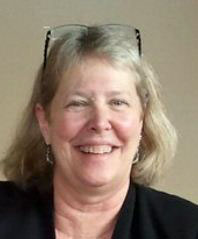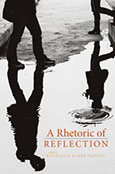
When discussions about advancements in rhetoric and composition studies occur, Kathleen Yancey not only brings her expertise to the talks; often she leads the conversation.
Most recently, Yancey was instrumental in bringing together numerous voices and opinions on an issue important to rhetoric and composition, reflection. The result of her stewardship is a collection of essays, A Rhetoric of Reflection (Utah State UP), which addresses what she has identified as a "third generation" of study in reflection. Sixteen scholars contributed their perspectives to the publication, including several with ties to the English department's Rhetoric and Composition program: Associate Professor Michael Neal and former Ph.D. students Liane Robertson and Kara Taczak. Yancey, a professor in the program, also wrote the book's introduction and contributed the concluding essay.

Yancey says she began researching this third generation of reflection about the time she learned about reflective practice in other contexts, among them surgical contexts. During the course of reading Atul Gawande's book Complications: A Surgeon's Note on an Imperfect Science, she took notice of a passage that described morbidity and mortality (M&M) conferences, weekly meetings that surgeons with hospital privileges attend.
"The reflective practice anchoring the M&M is, of course, somewhat different than the kind of reflection we've assigned in writing classrooms, but that alerted me to the idea that reflective practice, which occurs in different communities of practice, takes different forms and has different conventions, and that no one had mapped those," Yancey says. "Beginning to map those forms and conventions was part of the process of imagining the book."
The essays in A Rhetoric of Reflection are divided into six categories. Under the subject of Teaching and Assessment, Taczak and Robertson co-authored "Reiterative Reflection in the Twenty-First-Century Writing Classroom: An Integrated Approach to Teaching for Transfer," with Neal's essay, "The Perils of Standing Alone: Reflective Writing in Relationship to Other Texts," included under this heading as well. Topics the other authors addressed include Relationships: Reflection, Language, and Difference; Reflection and Media; Reflective Conversations Outside the Classroom; and Reflection and Genre. Yancey's concluding essay, "Defining Reflection: The Rhetorical Nature and Qualities of Reflection," reads across the chapters to identify themes expressed across them and to raise questions for future research.
Yancey says the goal with the selected contributions was to inform readers about developments in the theory, research, and practice of reflection, such as how reflection correlates with collegiate retention and graduation and how reflection enables a meaning-making operating at the intersection of the intellectual and the personal. The book's essays also consider how reflection can be both racialized and gendered, and how translingualism is inherently reflective as well as how current reflective practice occurs in all media, even though the conventions of reflection in some media - video, for example - continue to emerge.
In a more general sense, one of the book's insights is that the essay continues to provide a hospitable site for reflection. Even with a wide-ranging scope of subject matter, though, Yancey points out that the study of reflection is an on-going process. "Although our understanding of reflection is more sophisticated than in the past, hence the third generation, there is more yet to learn," she says.
In her introduction to A Rhetoric of Reflection, Yancey argues that the concept of students "reinventing the university" is one of the most important ideas examined during this third generation on reflection in writing studies. David Bartholomae, a distinguished scholar in composition studies, coined the phrase "inventing the university," which he explained in a 1986 journal article as a student needing to "learn to speak our language, to speak as we do, to try on the peculiar ways of knowing, selecting, evaluating, reporting, concluding, and arguing that define the discourse of our community." Yancey says that while she appreciates Bartholomae's articulation of the task before students, it's not quite a fully accurate description of the situation, as she understands it.
"Students don't so much invent the university as reinvent it in that they also change it - and us," Yancey says. "The university isn't a static institution so much as it is a fluid site of discourses, and in the spirit of Mikhail Bakhtin's heteroglossia, students both take from and contribute to the discourses constituting the university. In that regard, then, they reinvent the university, inventing it, of course, but re-inventing it, too - and we are all the better for it."
Bringing together the scholars who contributed to the collection of essays and managing the editing process was "a joy and a challenge" for Yancey.
"A joy because the contributors bring a perspective that is instructive - which is why you invited them to contribute in the first place - and a challenge, often for several reasons," she says. For example, "authors are so impassioned about their project that they contribute chapters twice as long as some others, so some chapters might need to be distilled. Some chapters interface with other chapters in surprising ways, which is brilliant, but the interface would need to be articulated, while other chapters might contradict other chapters, which could be interestingly provocative, but would also need to be articulated for a fuller conception of the concept, in this case, reflection."
"And then life can intervene, with schedules going awry!" she adds.
Once she finished her last tasks as editor for the book - reviewing copy-edited pages and page proofs, incorporating last-minute changes, , collaborating on the cover design and writing acknowledgments, and indexing the book, Yancey was ready to let go of it, "which of course was the plan all along."
"At the same time, through engaging in all the processes contributing to the book, you've learned a lot: I sometimes think that it is at the point that one could write a single-authored book on the topic, in part because of the context created by the edited collection," she says.
Yancey has been pleased with the response to the book: several colleagues have already assigned it to their graduate classes, and she recently learned that the book has been identified by Choice as a must-read:
"Written by some of the best-known rhetoric and composition scholars working on the subject of reflection, the essays revisit and revise earlier reflective practices, consider reflection in larger contexts, and theorize new possibilities for reflection, including multimodal reflection. This collection makes a valuable contribution to rhetoric and composition studies by articulating current practices and theories and demonstrating how the field is evolving in response to new technologies, classroom exigencies, and national priorities. . . . Highly recommended."
With this publication now available for scholars and educators, Yancey has turned her attention to future endeavors. She is currently working on three edited collections. The first, co-edited with Stephen McElroy, Director of FSU's Reading-Writing Center, is Assembling Composition, which theorizes writing through assemblage, drawing on both art and critical theory; it will be published in March 2017 by the prestigious Studies in Writing and Rhetoric Series. With three co-editors, she is also completing Rhetoric, Composition, and Disciplinarity, which theorizes the field as a discipline, due out from Utah State University Press in late 2017 or early 2018; and she is beginning another edited collection, ePortfolio-as-Curriculum: Diverse Models and Practices, which draws from ePortfolio models in various disciplines and contexts to articulate an ePortfolio curriculum.
"And not least, my book on everyday writing, which I hope to complete in the spring," Yancey says. "All of this: it's a full, challenging, and rewarding agenda."
